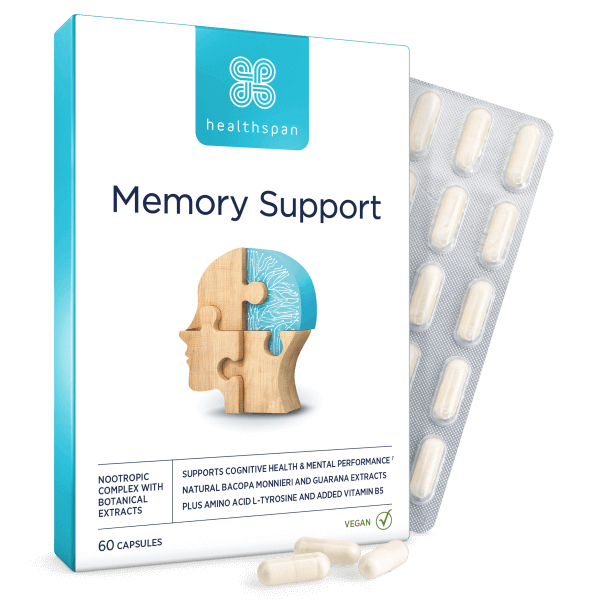Forgetting things is natural, but an excessive struggle to retain information can be worrying and affect your quality of life, as can 'brain fog' – difficulty concentrating and processing information. Dr Hilary Jones outlines the techniques and supplements that can help.
🕒 6 min read
Are you increasingly bothered by tip-of-the-tongue moments? Do you ever forget names, faces, dates, anniversaries, and other bits of important information? Do you forget where you left your keys or why you went upstairs? Do you ever worry that your memory is getting worse as you get older?
Forgetting is a natural part of how the brain functions, but for some people it can be a maddening or distressing experience. Often the problem is temporary, with loss of attention and focus resulting from stress or anxiety; after all, if we fail to process information in the first place, we cannot recall it later. But in some instances, it may be the first sign of cognitive decline or even early dementia.
Brain fog
'Brain fog' is somewhat different. This may include some mild memory loss or at least unusual forgetfulness, but people suffering from brain fog also describe a feeling of confusion and the inability to focus on more than one task at a time or to process information correctly.
This can occur due to the menopause, lack of sleep, nutritional deficiencies, ADHD, or chronic pain. There are also thousands of people experiencing brain fog through Long Covid or Post-COVID Syndrome following the pandemic.
Ways to improve memory
The good news is that both short and long-term memory can be improved. It's certainly not something that must inevitably decline and be reluctantly accepted: there are many measures we can take to preserve it and enhance our retention and recall. Nootropics are the new kids on the block and are creating a huge amount of interest. But what are they, how do they work, and can they really help with mental agility and memory?

Used in Indian Ayurvedic medicine for centuries, the Bacopa monnieri herb contains a variety of substances that can improve focus.
What are nootropics?
Nootropics are drugs, supplements or other compounds that improve cognitive and executive functions and enhance attention and memory. Herbal nootropic supplements in particular are gaining favour; you'll likely have heard of ginkgo biloba, ashwagandha, saffron and omega 3.
Herbal nootropic supplements
Bacopa Monnieri
Nootropics such as Bacopa monnieri have been used in Ayurvedic medicine for centuries. This perennial, creeping herb, also known as water hyssop or more poetically the herb of grace, contains a range of bioactive phytochemical compounds known as bacosides, which work together to reduce fatigue and increase focus.
Clinical studies into Bacopa monnieri demonstrate improvements in verbal learning, delayed word recall, memory acquisition and anxiety reduction. It is also sometimes described as a calming cognitive enhancer, thought to work by revitalising the fatty tissue of the brain and boosting its functions to combat brain fog.
Guarana
The Brazilian plant Paullinia cupana gives us guarana, used traditionally in Amazonian cultures and containing stimulants such as caffeine, theophylline and theobromine, as well as antioxidants such as tannins, saponins and catechins, which are important for mood and learning.

Memory Support
Helps concentration and memory
- Supports cognitive function as you age
- High-strength bacopa monnieri extract
- Added guarana for alertness
Other memory boosters
These nootropics are by no means new discoveries, although modern scientific research into their active ingredients and clinical benefits certainly is. Other so-called memory boosters include L-tyrosine and B group vitamins, both of which are thought to increase cognitive performance and improve brain health, motivation, and verbal fluency.
Nootropics are also considered to make it easier for people to adapt to physical, mental and emotional stresses and to find mental balance. This is why they are likely to find favour not just with those wanting to stay sharp as they age, but menopausal women, people studying for exams, esports competitors and anyone looking for something to help them with alertness and concentration.
Healthspan Memory Support
Healthspan's new Memory Support supplement contains both Bacopa Monnieri and Guarana extract. It also contains the amino acid L-tyrosine and vitamin B5. L-tyrosine is a precursor of the neurotransmitter dopamine and norepinephrine, both of which are important in sustaining working memory during multitasking.
One systematic review published in 2015 concluded that tyrosine "may benefit healthy individuals exposed to demanding situational conditions." In an area where we must be wary of unproven marketing claims, such peer-reviewed validated research is vital.
Vitamin B5, otherwise known as pantothenic acid, is one of the eight B group vitamins and is important in deriving energy from food, in blood cell production and the healthy functioning of the nervous system. Deficiency leads to fatigue, headaches and numbness of the hands and feet.
Other ways to improve brain health
There is much we can do as individuals to maintain our brain health and memory. As our brain is like a muscle that must be exercised, we should take part in stimulating activities. Here are some examples:
- Learn a new skill such as a sport or a language.
- Preserve social contacts by volunteering or joining groups or clubs.
- Ensure you get adequate sleep and avoid excess stress.
- Resist the demands of too much multitasking and instead concentrate on one job at a time.
- Maintain physical exercise and ensure a healthy, balanced diet.
- Reduce screen time on electronic devices and give your brain a chance to wind down at the end of a busy day.
- Avoid any self-inflicted damage to your brain, such as the physical trauma incurred through contact sports or drinking excess alcohol and smoking.
Mental exercise
Mental exercises are vital for keeping your brain active and for maintaining concentration and the speed and clarity of thought. Things like crosswords, sudoku and handicrafts are good examples, with medical PET scans able to demonstrate visually how brains are stimulated by such activities.
Diet
In terms of diet, a growing body of clinical evidence supports the benefits of oily fish, which is rich in omega 3 unsaturated fatty acids, together with foods rich in antioxidants and healthy carbohydrates. Be aware that certain fatty or processed foods can impair memory and cognitive function, leading to the build-up of amyloid plaques in the brain and hardening of the arteries, contributing to arteriosclerosis and vascular dementia.
Prescription medicine
Pharmaceutical medicines are available such as donepezil (Aricept). This is not a cure, but at least it has been found to slow down the progress of Alzheimer's in many patients. Like other similar substances it works by boosting the important neurotransmitter acetylcholine or impacting the enzymes that help to create or destroy it. Herbal nootropics may have a similar influence.
Quality matters
With an ageing population concerned about memory loss and increasing awareness of mental health issues such as lack of attention and focus, declining memory, anxiety, and depression, there will be increasing demand for energy and memory boosters, antidepressants, and brain enhancers. Be sure to remember how important your brain is, and check that you are buying from an established and trusted source.







